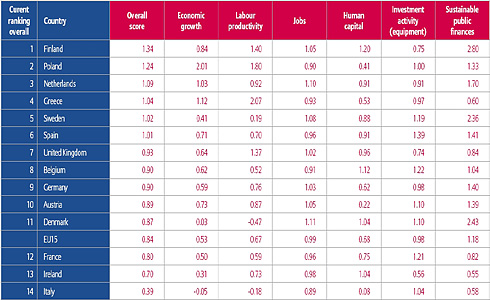The European Growth and Jobs Monitor, an annual ranking by Allianz SE and the Lisbon Council that measures progress in the Lisbon Agenda, shows the recession affecting all European countries in the course of 2008. The Monitor's 2008 economic growth indicator lost nearly half of its previous year value, falling from 0.97 to 0.53. (A value of 1.0 means that objectives are being met.) The productivity growth indicator fell even further, from 1.80 to 0.67, losing nearly two thirds of its value. This is expected to have correspondingly negative ramifications for employment and public finances in 2009, bringing the Monitor down even more.
Recession slows Europe in its Lisbon objectives
Download
Finland maintains its top position in the ranking as a result of its excellent human capital score and stable public finances. Poland is also holding steady at second place despite employment problems thanks to its relatively high rates of economic and productivity growth.
Overall, only six countries (Finland, Poland, the Netherlands, Greece, Sweden, Spain) still achieve a 2008 rating above 1.0, meaning they are meeting the targets. In 2007, all countries except Italy exceeded this target. All fourteen states show noticeable to severe declines in 2008 compared to the previous year, from 0.08 points (Spain) to 0.78 points (Ireland). The Monitor's negative trend will continue in 2009, pushing additional countries below the target level of 1.0.


Michael Heise, Chief Economist with Allianz SE and author of the study
Germany losing ground
Germany fell faster than the average in 2008 ( 0.36 points compared to the EU15 average of 0.28), sliding from eighth to ninth place. The stability of public finances is at a good level (1.4), however, which is noteworthy in the current situation. This gives the government some flexibility in responding to the crisis.
The Netherlands, whose economic growth is not suffering as much as that of its competitors and where the employment indicator actually improved, posted the greatest gain and rose to third place. Ireland, hit especially hard by the crisis due to its dependency on exports and financial services, suffered the heaviest losses and slid from fourth to thirteenth place. Italy's economic and productivity growth dropped sharply again in 2008, putting it once more at the bottom of the list.

European Growth and Jobs Monitor: Current scoring (2008/Q3)
"Countries will emerge stronger from the crisis"
Michael Heise, Chief Economist with Allianz SE and author of the study, expects growth to already begin reviving in 2009 based on Europe‘s fundamental strengths and positive concomitant factors such as low prices for oil and raw materials, the relaxed monetary policy and the economic stimulus packages.
Heise also notes the opportunities: "Those countries that favor long-term concepts and permanent reforms over short-term demand-side management will emerge stronger from the crisis. Investments in future technologies and human capital provide growth incentives. That applies not only to sunrise industries but to our key traditional sectors such as automotive and engineering."
Long-term investment goals in urgent demand
Paul Hofheinz, President of the Lisbon Council, adds: "Without the current crisis, Europe would have continued the strong growth it showed from 2005 to 2008 and reached the ambitious Lisbon target of 2010. Long-term investment goals, innovations and human resources development are now needed more urgently than ever to put Europe back on track to becoming the leading economic area."
The European Growth and Jobs Monitor, a joint publication of Allianz SE economists and the Lisbon Council think tank, is issued each year just before the Spring European Council. It will be presented on March 12 in Brussels, with European Commission President José Manuel Barroso in attendance. The Monitor analyzes the development in fourteen EU member states based on six indicators: economic growth, productivity growth, employment, human capital, growth-related investment and sustainability of public finances.
As with all content published on this site, these statements are subject to our Forward Looking Statement disclaimer.
Link to the disclaimer